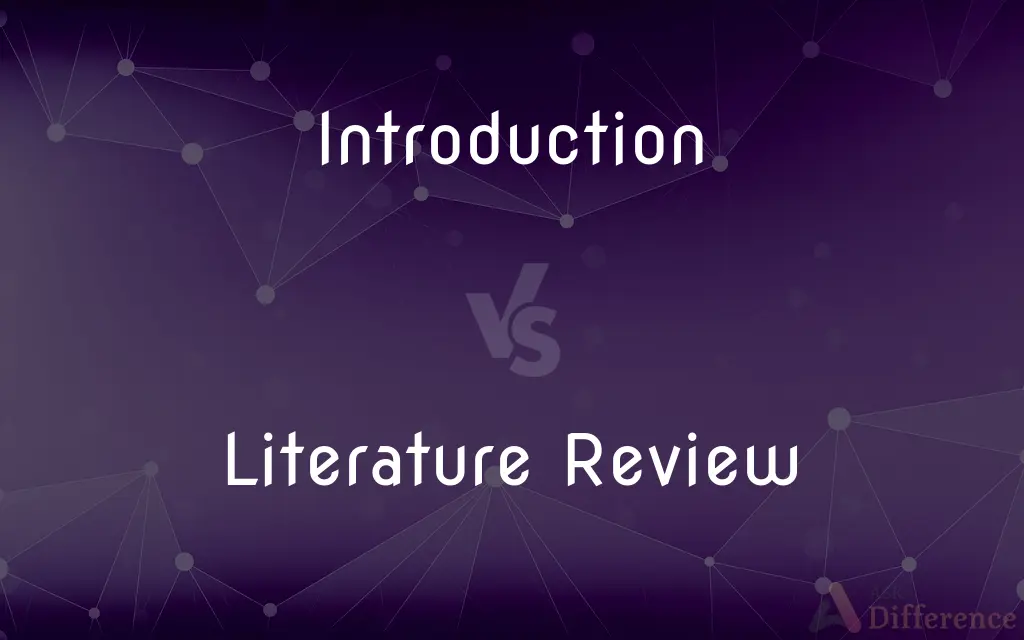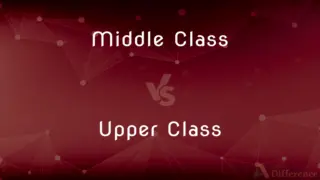Introduction vs. Literature Review — What's the Difference?
Edited by Tayyaba Rehman — By Fiza Rafique — Published on December 6, 2023
Introduction presents a topic's overview; Literature Review synthesizes existing research on it.

Difference Between Introduction and Literature Review
Table of Contents
ADVERTISEMENT
Key Differences
The Introduction and Literature Review both serve foundational roles in academic writing. The Introduction provides a general overview of the topic, setting the stage for readers. In contrast, the Literature Review delves deeper, examining existing research on the topic.
Introduction sections are typically brief, aiming to hook the reader and outline the main points the paper will address. On the other hand, the Literature Review systematically presents and analyzes previous studies, highlighting patterns, gaps, or controversies.
When reading an Introduction, one expects to understand the research question, its significance, and the scope of the paper. The Literature Review, conversely, offers a comprehensive background, showcasing how the current work fits into the broader academic conversation.
A well-crafted Introduction should spark interest and provide clarity on the subject matter. The Literature Review should demonstrate the author's extensive knowledge, identifying key findings and methodologies from prior research.
Essentially, while the Introduction sets the stage, the Literature Review builds the context, offering readers a panoramic view of what's known and what remains to be explored.
ADVERTISEMENT
Comparison Chart
Purpose
To provide an overview and set the context
To analyze and synthesize existing research
Length
Typically brief
Can be extensive, depending on the research's depth
Content
Research question, significance, scope
Previous studies, methodologies, findings, gaps
Role in Paper
Initiates the discussion and presents the topic
Builds the background and context for the research
Relation to Other Research
May briefly mention other studies
Systematically reviews and critiques other research on the topic
Compare with Definitions
Introduction
An initial section that outlines the background of the topic.
The research paper started with an Introduction highlighting the problem's gravity.
Literature Review
An evaluation of existing research on a topic.
Her Literature Review highlighted the conflicting theories on cellular aging.
Introduction
A means of familiarizing one thing with another.
His novel served as an Introduction to the world of fantasy fiction.
Literature Review
A comprehensive overview of what's known about a topic.
The Literature Review took her weeks to compile due to the vast number of relevant studies.
Introduction
The act or process of introducing or the state of being introduced.
Literature Review
A synthesis of scholarly publications on a specific subject.
The Literature Review covered decades of studies on childhood development.
Introduction
A means, such as a personal letter, of presenting one person to another.
Literature Review
An analysis identifying patterns or gaps in previous studies.
Through his Literature Review, he discovered a methodological flaw common in prior experiments.
Introduction
Something recently introduced; an innovation
"He loathed a fork.
It is a modern introduction which has still scarcely reached common people" (D.H. Lawrence).
Literature Review
A section that contextualizes a study within the broader academic landscape.
The Literature Review positioned her research in the midst of an ongoing debate.
Introduction
A preface, as to a book.
Introduction
(Music) A short preliminary passage in a larger movement or work.
Introduction
A basic introductory text or course of study.
Introduction
The act or process of introducing.
The introduction of a new product into the market
Introduction
A means, such as a personal letter, of presenting one person to another.
David was feeling groggy at his introduction to Sophie, and didn't remember her name.
Introduction
An initial section of a book or article, which introduces the subject material.
This book features a preface by a well-known botanist, and an introduction by the author's mentor at university.
Introduction
A written or oral explanation of what constitutes the basis of an issue.
Introduction
The act of introducing, or bringing to notice.
Introduction
The act of formally making persons known to each other; a presentation or making known of one person to another by name; as, the introduction of one stranger to another.
Introduction
That part of a book or discourse which introduces or leads the way to the main subject, or part; preliminary; matter; preface; proem; exordium.
Introduction
A formal and elaborate preliminary treatise; specifically, a treatise introductory to other treatises, or to a course of study; a guide; as, an introduction to English literature.
Introduction
The first section of a communication
Introduction
The act of beginning something new;
They looked forward to the debut of their new product line
Introduction
Formally making a person known to another or to the public
Introduction
A basic or elementary instructional text
Introduction
A new proposal;
They resisted the introduction of impractical alternatives
Introduction
The act of putting one thing into another
Introduction
The act of starting something for the first time; introducing something new;
She looked forward to her initiation as an adult
The foundation of a new scientific society
He regards the fork as a modern introduction
Introduction
A preliminary explanation or overview.
The book begins with an Introduction detailing the author's inspiration.
Introduction
The section of a text presenting its main theme.
The Introduction of her thesis posed a provocative question.
Introduction
The beginning or entry point.
The Introduction of the event featured a renowned keynote speaker.
Common Curiosities
How does a Literature Review differ from an Introduction in terms of content?
While an Introduction outlines the main points and significance of a topic, a Literature Review analyzes and synthesizes existing research on it.
What should I include in the Introduction of my paper?
The Introduction should present the research question, its significance, and the scope of the paper.
How long should an Introduction be?
The length can vary, but an Introduction should be concise, offering a clear overview of the topic.
Is it essential for a research paper to have both an Introduction and a Literature Review?
Typically, yes. The Introduction sets the stage, and the Literature Review provides a comprehensive background.
How detailed should a Literature Review be?
A Literature Review should be thorough, covering key findings, methodologies, and highlighting patterns or gaps from prior research.
Should an Introduction be captivating?
Yes, a well-crafted Introduction should engage readers and generate interest in the topic.
What's the main purpose of an Introduction in academic writing?
The Introduction provides an overview and sets the context for the topic being discussed.
Can a Literature Review identify gaps in existing research?
Absolutely, a Literature Review often highlights areas that need further exploration.
Do all research papers have a Literature Review section?
Most do, especially in academic contexts, as it provides a background and context for the research.
Is the Introduction the first section of a research paper?
In most academic papers, yes, the Introduction comes before the Literature Review and other sections.
What's the primary goal of a Literature Review?
The Literature Review aims to showcase the current work within the broader academic conversation by reviewing prior research.
Can an Introduction mention previous studies?
Yes, an Introduction can briefly mention other studies, but detailed analysis is reserved for the Literature Review.
Is the Literature Review limited to academic articles?
While primarily based on scholarly publications, Literature Reviews can also include books, reports, and other relevant sources.
Is a Literature Review subjective?
While it involves analysis, a Literature Review should be an objective evaluation of existing research.
Can a Literature Review include recent research?
Yes, a Literature Review should encompass both foundational and recent studies related to the topic.
Share Your Discovery

Previous Comparison
Hot Wax vs. Cold Wax
Next Comparison
Middle Class vs. Upper ClassAuthor Spotlight
Written by
Fiza RafiqueFiza Rafique is a skilled content writer at AskDifference.com, where she meticulously refines and enhances written pieces. Drawing from her vast editorial expertise, Fiza ensures clarity, accuracy, and precision in every article. Passionate about language, she continually seeks to elevate the quality of content for readers worldwide.
Edited by
Tayyaba RehmanTayyaba Rehman is a distinguished writer, currently serving as a primary contributor to askdifference.com. As a researcher in semantics and etymology, Tayyaba's passion for the complexity of languages and their distinctions has found a perfect home on the platform. Tayyaba delves into the intricacies of language, distinguishing between commonly confused words and phrases, thereby providing clarity for readers worldwide.












































